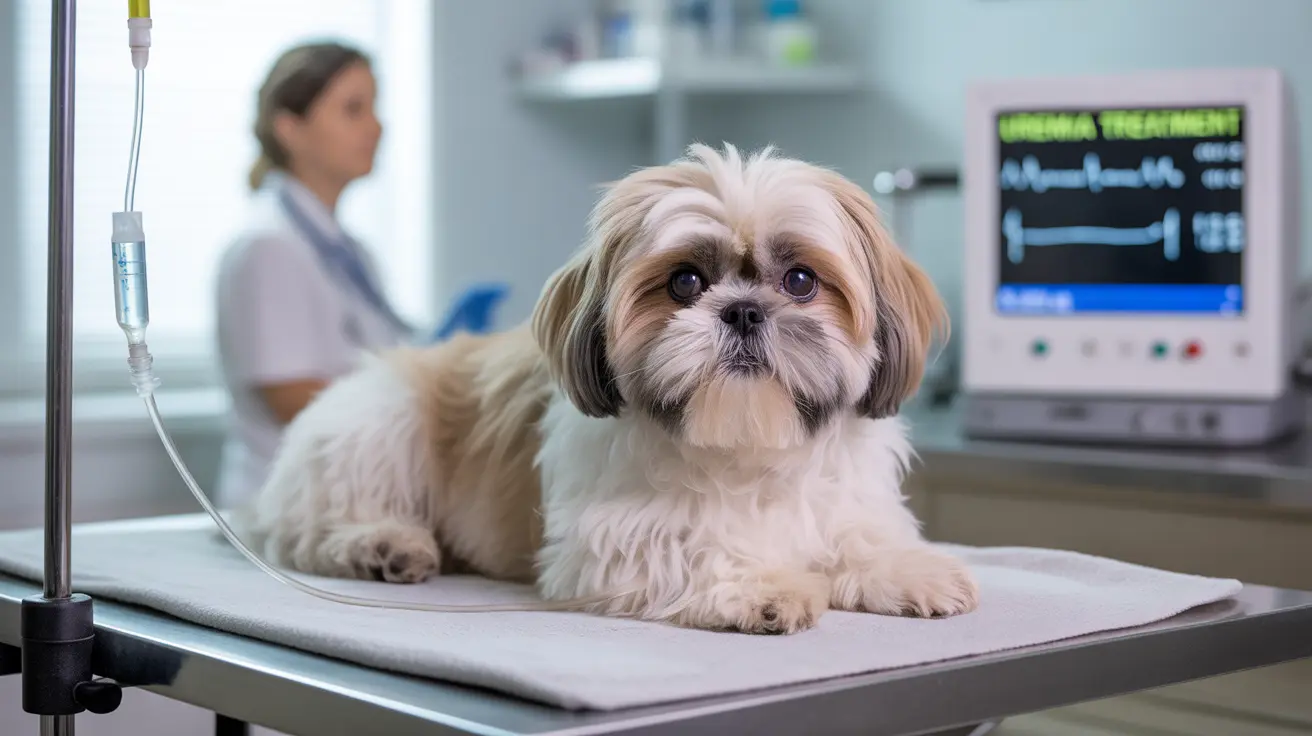What is Uremia in Dogs?
Uremia in dogs is a serious medical condition that occurs when the kidneys fail to effectively filter waste products from the blood. This dangerous buildup of toxins, particularly urea, can lead to severe complications and requires immediate veterinary attention. The condition typically develops as a consequence of acute or chronic kidney failure, making early detection and treatment crucial for your pet's survival.
While uremia can affect any dog, certain factors like age, breed predisposition, and underlying health conditions can increase the risk. Understanding this condition is essential for every dog owner, as quick recognition of symptoms can make a significant difference in treatment outcomes.
Common Causes of Uremia
Several factors can lead to the development of uremia in dogs:
Toxic Exposure
- Antifreeze ingestion (ethylene glycol)
- Certain medications, especially NSAIDs
- Heavy metals and chemical toxins
Medical Conditions
- Acute or chronic kidney disease
- Severe dehydration
- Heart failure
- Urinary tract obstruction
- Genetic kidney disorders
Recognizing the Signs and Symptoms
The symptoms of uremia can develop gradually or appear suddenly, depending on the underlying cause. Common signs include:
- Increased thirst and urination
- Loss of appetite and weight loss
- Vomiting and diarrhea
- Lethargy and weakness
- Bad breath with a distinct ammonia smell
- Mouth ulcers
- Pale gums
- Disorientation or confusion in severe cases
Diagnosis and Veterinary Care
Veterinarians use various diagnostic tools to confirm uremia and assess its severity:
- Blood tests to measure BUN and creatinine levels
- Complete urinalysis
- Kidney ultrasound or X-rays
- Blood pressure monitoring
- Additional tests to identify underlying causes
Treatment Options and Management
Treatment for uremia focuses on addressing the underlying cause while managing symptoms and supporting kidney function. The approach typically includes:
Immediate Interventions
- Intravenous fluid therapy
- Medication to control vomiting and nausea
- Dietary modifications
- Treatment for any underlying conditions
Long-term Management
- Special kidney-friendly diet
- Regular fluid therapy
- Ongoing medication as needed
- Frequent veterinary monitoring
Prevention and Monitoring
While not all cases of uremia can be prevented, certain measures can help reduce risk:
- Regular veterinary check-ups
- Maintaining proper hydration
- Preventing access to toxic substances
- Early intervention for kidney-related symptoms
- Following recommended dietary guidelines
Frequently Asked Questions
What are the most common symptoms of uremia in dogs and how do I recognize them?
The most common symptoms include increased thirst and urination, loss of appetite, vomiting, lethargy, and bad breath with an ammonia odor. You may also notice mouth ulcers, pale gums, and behavioral changes in severe cases.
What causes a dog to develop uremia, and are certain breeds or ages more at risk?
Uremia typically develops due to kidney failure, which can be caused by toxin exposure, infections, or underlying health conditions. Senior dogs and certain breeds with genetic predispositions to kidney problems are at higher risk.
How is uremia in dogs diagnosed, and what tests will my vet perform?
Diagnosis involves blood tests to measure kidney values (BUN and creatinine), urinalysis, and potentially imaging studies like ultrasound or X-rays. Your vet may also check blood pressure and perform additional tests to identify underlying causes.
What treatment options are available for dogs with uremia, and what is the prognosis?
Treatment typically involves fluid therapy, medication for symptoms, dietary changes, and addressing underlying causes. Prognosis varies depending on the cause and severity, with early detection and treatment offering the best outcomes.
How can I help prevent my dog from developing uremia or kidney disease?
Prevention includes ensuring proper hydration, maintaining regular vet check-ups, preventing access to toxins, and following a appropriate diet. Early recognition and treatment of kidney-related symptoms is also crucial.
Conclusion
Uremia in dogs is a serious condition that requires prompt veterinary attention. Understanding the signs and causes can help pet owners seek treatment early, potentially improving outcomes. While some cases may be preventable, others may require long-term management. Regular veterinary care and monitoring remain essential for maintaining your dog's kidney health and overall well-being.






